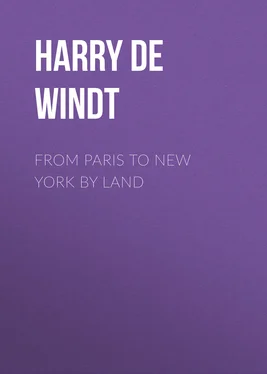Harry De Windt - From Paris to New York by Land
Здесь есть возможность читать онлайн «Harry De Windt - From Paris to New York by Land» — ознакомительный отрывок электронной книги совершенно бесплатно, а после прочтения отрывка купить полную версию. В некоторых случаях можно слушать аудио, скачать через торрент в формате fb2 и присутствует краткое содержание. Жанр: foreign_prose, foreign_antique, на английском языке. Описание произведения, (предисловие) а так же отзывы посетителей доступны на портале библиотеки ЛибКат.
- Название:From Paris to New York by Land
- Автор:
- Жанр:
- Год:неизвестен
- ISBN:нет данных
- Рейтинг книги:4 / 5. Голосов: 1
-
Избранное:Добавить в избранное
- Отзывы:
-
Ваша оценка:
- 80
- 1
- 2
- 3
- 4
- 5
From Paris to New York by Land: краткое содержание, описание и аннотация
Предлагаем к чтению аннотацию, описание, краткое содержание или предисловие (зависит от того, что написал сам автор книги «From Paris to New York by Land»). Если вы не нашли необходимую информацию о книге — напишите в комментариях, мы постараемся отыскать её.
From Paris to New York by Land — читать онлайн ознакомительный отрывок
Ниже представлен текст книги, разбитый по страницам. Система сохранения места последней прочитанной страницы, позволяет с удобством читать онлайн бесплатно книгу «From Paris to New York by Land», без необходимости каждый раз заново искать на чём Вы остановились. Поставьте закладку, и сможете в любой момент перейти на страницу, на которой закончили чтение.
Интервал:
Закладка:
I shall not forget my surprise one day when nearing Yakutsk to overhear one driver apparently addressing another in pure Turkish, a language with which I am slightly acquainted. The mystery was explained by Captain Zuyeff, who told me that there is such a marked resemblance between the language in question and Yakute that a merchant from Constantinople would readily be understood in the market-places of this far-away frozen land. Many words are precisely similar, and the numerals up to ten are identical (see Appendix). On several occasions, while crossing the Yakute region, the natives failed to comprehend my meaning in Russian, but when I spoke in Turkish they at once understood me 25 25 This race is supposed to be a Turkish branch of the Turanian stock. Latham informs us that their language is intelligible at Constantinople, and that the majority of their words are Turkish; observing, also, that their traditions bespeak for them a Southern origin. He says: 'The locality of the Yakutes is remarkable, it is that of a weak section of the human race pressed into an inhospitable climate by a stronger one, yet the Turks have ever been the people to displace others rather than be displaced themselves.'"—"Frozen Asia," by Professor Eden.
.
We experienced considerable difficulty in getting away from Yakutsk, indeed had I not possessed my invaluable passport the expedition would probably have remained there. For every day invitations came pouring in for days ahead, and the entertainers would not hear of a refusal. At last, however, firmness became necessary, and I insisted (being empowered by my magic document to do so) upon immediate preparations being made for our departure, although every official in the place urged me to abandon a project which they averred could only end in disaster. By suggestion of the Governor a Siberian Cossack from the garrison, Stepan Rastorguyeff, joined the expedition to accompany us so far as I should deem expedient, for our further progress now bristled with difficulties. This man was employed to escort political exiles to the distant settlement of Sredni-Kolymsk, near the Arctic Ocean, and was therefore acquainted with the best way of reaching that remote post, indeed he afterwards proved an invaluable addition to our party.
It seemed hard that fate should have selected this year of all others to render the journey from Yakutsk to the north almost an impossibility. In the first place reindeer were so scarce and weak that the 1800 odd miles to Sredni-Kolymsk (which can generally be accomplished, under favourable circumstances, in four or five weeks) might now take us three months to cover. In this case failure of the journey and a summer in this dreary settlement would be our fate; for from May until October, Sredni-Kolymsk is isolated by marshy deserts and innumerable lakes, which can only be crossed in a sled. Throughout the summer, therefore, you can neither reach the place nor leave it.
A still more serious matter was an epidemic which had been raging amongst the Yakutes of the far north, and a fear of which had driven the Tchuktchis (or natives of the coast) into the interior of their country and along the seaboard in an easterly direction until their nearest settlement was now nearly six hundred miles distant from Sredni-Kolymsk, at which place I had calculated upon finding these natives, and utilising them as a means of procuring food and lodging and guidance along their desolate coast. Now, however, over six hundred miles of ice without a stick of shelter or mouthful of food stared me in the face. It was also suggested that, if many of the Tchuktchis had perished from the dread malady the remainder might have retreated in a body inland, in which case death from starvation seemed an unpleasant but not unlikely contingency. For beyond the aforesaid six hundred miles lay another stretch of about 1600 miles more, before we could reach our destination: Bering Straits.
Lastly, Sredni-Kolymsk had itself suffered from so serious a famine that an expedition had lately been despatched from Yakutsk to the relief of the sufferers. Provisions there would therefore be unprocurable. Also, most of the dogs in the Kolyma district had perished from a scarcity of fish the previous season, and as dogs were our sole means of transport along the Arctic Coast, the reader will admit that, all things considered, my expedition did not leave Yakutsk under the rosiest of conditions!
Nevertheless I cannot hope to adequately repay the kindness shown by every official in Yakutsk, from the Governor downwards, during that trying time, for it was undoubtedly their timely assistance which eventually kindled the bright flame of success out of the ashes of a forlorn hope. As soon as it was realised that my resolve to proceed northward was inflexible, every man worked to further my ends as though he himself was embarking upon the hazardous trip. Even the Governor was continually concocting plans to render our voyage as easy as possible, and to that end despatched a Cossack three days ahead of us, so that reindeer might be forthcoming at the stations without delay. But his Excellency evidently looked upon the scheme as a mad one, and my daily anxiety was lest he should suddenly take the initiative, set the wires in motion with Irkutsk, and put a final stopper on our departure for America—overland.
We now disposed of our cumbersome Yakute sleighs and exchanged them for "nartas," or reindeer-sleds, each drawn by four deer. A "narta" is a long narrow coffin-shaped vehicle about 7 ft. long by 3 ft. broad, fitted with a movable hood, which can be drawn completely over during storms or intense cold. The occupant lies at full length upon his mattress and pillows, smothered with furs, and these tiny sleds were as automobiles to wheelbarrows after our lumbering contrivances on the Lena. A reindeer-sled is the pleasantest form of primitive travel in the world, over smooth hard snow; but over rough ground their very lightness makes them roll and pitch about like a cross Channel steamer, to the great discomfort of the traveller.
Furs were my next consideration, for here we discarded civilised clothing and assumed native dress. The reader will realise what the cold must have been when I say that we often shivered inside the covered sleighs (where, however, the temperature never rose above 10° below zero), under the following mountain of material: two pairs of Jaeger singlets and drawers, thin deerskin breeches and three pairs of thick worsted stockings. Over this a suit of Arctic duffle (or felt of enormous thickness), and a pair of deerskin boots reaching above the knee and secured by leathern thongs. Then a second pair of deerskin breeches and a garment called by the Yakutes a "kukhlanka," a long, loose deerskin coat reaching to the knees, with a hood of the same material lined with wolverine. Under this hood we wore two close-fitting worsted caps and a deerskin cap with ear flaps. Two pairs of worsted gloves and one of bearskin mits, reaching almost to the elbow, completed the outfit. I had hoped to procure furs for a moderate price in Yakutsk. But for some occult reason deerskins cost almost as much here as in Moscow. The good old days are past when peltry was so cheap and European goods so dear, that an iron cauldron fetched as many sable skins as it would hold! Stepan also insisted upon the purchase of a number of iron horse-shoes, which he explained were to be affixed to our moccasins in order to cross the Verkhoyansk mountains in safety. But the method did not strike me at the time as practical, and I afterwards had even less respect for its inventor.
Lastly provisions had to be purchased. Our original outfit brought from London comprised rations sufficient for six weeks; but this I was determined not to break in upon, unless absolutely necessary, before the Arctic coast was reached. There was hardly any food to be procured between Yakutsk and Verkhoyansk, and, according to Stepan, still less beyond that isolated village. A reindeer-sled was therefore packed to its utmost capacity with black bread, salt fish, various tinned provisions, and a portion of some animal unknown, weighing (in a raw condition) about 100 lbs. I use the term "animal unknown," as, when cooked at the first station, the latter looked and tasted exactly like horse-flesh. I mentioned the fact to Stepan, who was already installed as chef , and he informed me that horse was regarded as a great delicacy by the Yakutes, and fetched twice the price of any other meat in their city. "It was bought as beef," added the Cossack, "so that anyhow we have got the best of the bargain." There was nothing, therefore, for it but to fall to with knife and fork, and with as little repulsion as possible, upon the docile friend of man!
Читать дальшеИнтервал:
Закладка:
Похожие книги на «From Paris to New York by Land»
Представляем Вашему вниманию похожие книги на «From Paris to New York by Land» списком для выбора. Мы отобрали схожую по названию и смыслу литературу в надежде предоставить читателям больше вариантов отыскать новые, интересные, ещё непрочитанные произведения.
Обсуждение, отзывы о книге «From Paris to New York by Land» и просто собственные мнения читателей. Оставьте ваши комментарии, напишите, что Вы думаете о произведении, его смысле или главных героях. Укажите что конкретно понравилось, а что нет, и почему Вы так считаете.












